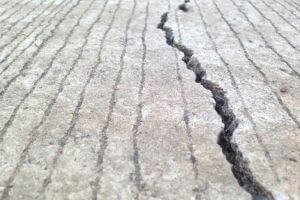
Slab Leaks and What to Do About Them
There are different engineering types of foundations for your home. One is called a crawl space. Generally speaking, older homes are built with crawl spaces. The benefit of crawl spaces is the ease of access for repairs. The other type of foundation for a home is called a “slab.” “Slab” is the common term that is used to refer to your home’s concrete foundation. Most modern homes are built on a slab.
During construction, plumbing lines are laid out then poured into the concrete foundation. Plumbing that is poured into a slab is generally reliable. However, when problems arise repairs can be expensive and invasive, and allowing the leak to continue can further damage your home’s foundation.
Knowing about slab leaks can prepare you for what to look for and help you choose a professional to find and repair your leaks. Slab leaks should be repaired as soon as possible to prevent further damage to your home’s foundation, along with health hazards to your family.
Why Slab Leaks Happen
Slab leaks occur when pipes that are poured into the concrete of your home’s foundation begin to fail and leak water or sewage. There are a few reasons for failure:

- High Water Pressure: Your home is fitted with a device to regulate water pressure in your pipes. However, over time this regulator can fail and cause damaging amounts of pressure in your pipe. Consistent high pressure will eventually lead to a pipe burst.
- Pipe Damage: Pipes can be damaged due to improper installation or shifts in the foundation. Also, continuous expansion and contraction from hot or cold water flowing through the pipe will cause friction that will cause the pipe to fail over time.
Common Symptoms of Slab Leaks
When leaks occur in your slab, water and sewage can migrate up through the concrete and enter your home. Water may also travel from under your slab and manifest in a constant wet spot on your lawn.

Signs that your slab is leaking can include:
- Foul Odor Near the Floor - This is caused by sewage seeping upward into the living area. It could also be an indication of mold or mildew living off of the moisture.
- Wet Spots in Carpet or Buckling of Floors - Water coming up through the slab will pool in carpets and can ruin laminate floors by causing them to expand and buckle.
- Cracked or Moldy Walls - Mold and mildew can grow in areas that are constantly moist.
- Sound of Water Flowing - When all appliances are off and you can still hear water flowing, you might have a slab leak.
- Water Meter Is Turning - You might have a slab leak if no water is running in the home and your meter is still turning.
How Plumbers Detect Leaks

This process is fairly invasive so it’s important that the foundation is opened up near the leak so the hole is as small as possible. All leaks make noise so a plumber will use specialized microphones to locate the leak.
It is important to locate and repair the leaks as soon as possible to prevent them from getting worse or causing more damage.
About Nixco Plumbing Inc.
Nixco Plumbing Inc. has been providing plumbing services in Mason, OH for over 40 years. Their experts offer 24-hour emergency services for residential and commercial needs. Check out their Get Green initiative that includes Energy Star certified water tank and low flow toilet installation.
Distribution Links +
- kake.com
- lubbocks969thebull.com
- fox21delmarva.com
- wboc.com
- wicz.com
- tulsacw.com
- erienewsnow.com
- weny.com
- 1007thescore.com
- doublet973.com
- 937theeagle.com
- fox34.com
- lubbockcw.com
- magic1065.com
- mylubbocktv.com
- oldies977lubbock.com
- 1077yesfm.com
- rfdtv.com
- ktvn.com
- wrcbtv.com
- wfmj.com
- htv10.tv
- snntv.com
- central.newschannelnebraska.com
- metro.newschannelnebraska.com
- southeast.newschannelnebraska.com
- midplains.newschannelnebraska.com
- northeast.newschannelnebraska.com
- plattevalley.newschannelnebraska.com
- panhandle.newschannelnebraska.com
- rivercountry.newschannelnebraska.com
- wrde.com
- telemundonuevomexico.com
- cbs19news.com
- wfxg.com





